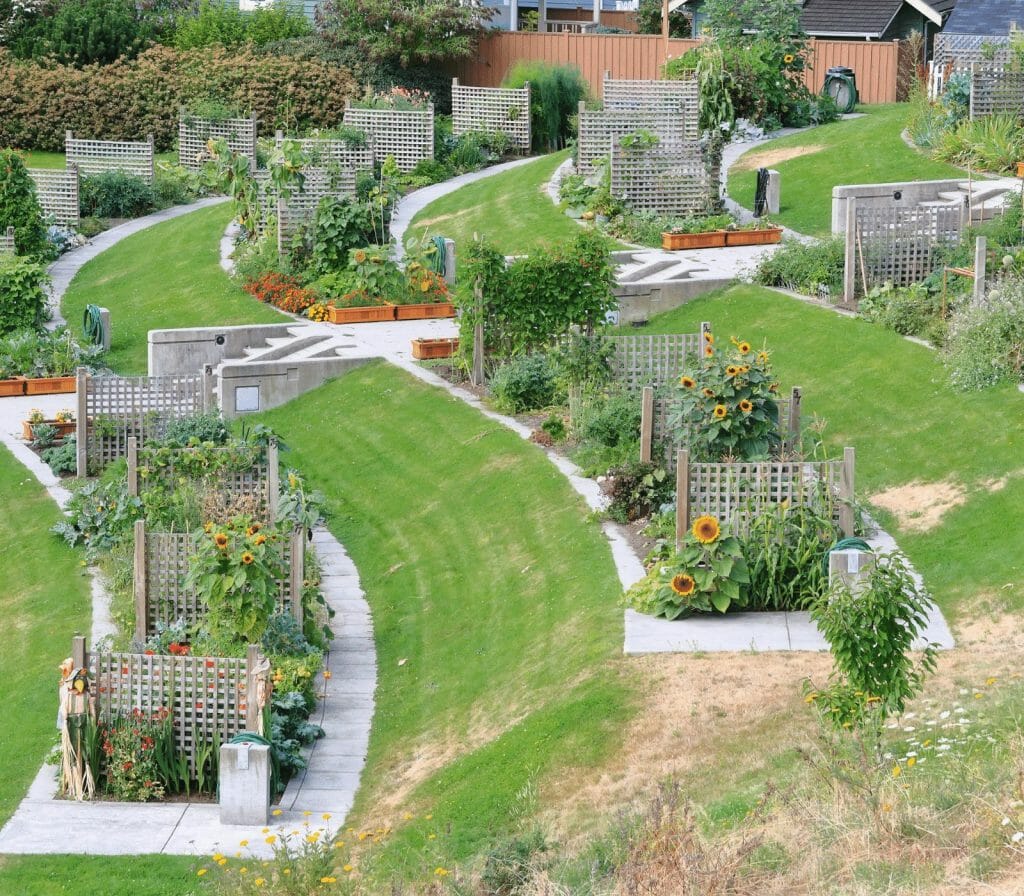More Than Just a Community Garden

More Than Just a Garden!
A community garden does much more than growing fruit and vegetables
(Global Heart | Esther Haasnoot) Community gardens are more than just places to grow your own fruit and vegetables. When you participate in a community garden, you enter a space filled with opportunities for new friendships, better health, and quality of life.
Why community gardens are perfect for cultivating well-being
There is nothing more satisfying than growing your own fresh herbs, flowers, fruits, and vegetables. Especially when you spend most of the day behind a desk, it’s a welcome change to work with your hands and feel physically connected to the earth.
Whether you want to create a community garden or connect, these are the plus points of community gardens that can motivate you to do so.
The Many Benefits of a Community Garden

Beautifying and Decorating cities
Not everyone has their own garden, but many cities have fallow land. Suitable land that is unused and fills with garbage. When the urban gardeners take over, they clean up the mess. The fallow land turns into lively greenery. Which improves the quality of life for everyone in the neighborhood, not just for the people who take care of the garden.
This is precisely the idea behind communal gardens. In the shared plots, people come together to grow fresh vegetables and flowers. Some cities turn unused land into green plots, giving people the chance to enjoy gardening. Moreover, it is a win-win because research shows that having a communal garden increases real estate value in the area.
A Blueprint for a Healthier lifestyle
However, increased urbanization has made it more challenging to contact nature, which is a pity. Because the character is so important for our overall health.
Spending two hours a week in nature is linked to better health and well-being. Several studies indicate that spending time in nature brings physical, mental, and social benefits. These include stress reduction, improved mood, accelerated healing, attention recovery, productivity, and increased imagination and creativity.
Participation in a community garden also encourages people to make healthier choices. For example: Eating the products from a community garden can motivate people to eat fresh, locally grown food. This can improve eating patterns and overall health. Besides, some of these community garden projects can be reached on foot or by bike, which is also suitable for our condition and the environment.
Some Physical Benefits of Gardening
Adults need at least 150 minutes of exercise per week. Many of us lag behind that goal. With all the bending, digging, lifting, and pulling, gardening offers a full-body workout. Working toward a tangible goal, whether pulling weeds or planting vegetables, gives you a sense of satisfaction.
Moreover, most people are deficient in vitamin D. Because, in the past century, we have increasingly switched to living indoors. Vitamin D helps in the formation of strong, healthy bones in children but is also linked to the prevention of illness and depression. The more time you spend outdoors, the greater the chance you have of increasing your vitamin D content.
Improving Mental Health
Perhaps less obvious is the positive influence that gardening can have on our mental health. Psychologists agree that spending time in nature and outdoors improves mental health. In fact, research has shown that gardeners generally have a higher level of life satisfaction, greater self-esteem, and fewer feelings of depression and fatigue than non-gardeners. Staying outdoors interacting with a natural environment helps us feel less stressed. It also reduces the symptoms of depression, improves our concentration and attention, and helps us recover from mental fatigue.
Just 20 minutes in nature is enough to improve anyone’s well-being. In this respect, it may not be entirely surprising that some doctors prescribe nature recipes to their patients. Nowadays, doctors are encouraging them to go outside and enjoy a little of an “eco-therapy.” Gardening gives people the chance to enjoy the fresh air and healthy outdoor exercise. They also provide a peaceful retreat from the noise and the hustle and bustle of a city district, relieving stress.
Gardeners also share their knowledge, skills, and experiences and develop relationships and support networks. People with strong social networks have a higher life expectancy, more excellent resistance to stressful events, and fewer visits to the doctor.

Promoting Connection and Inclusion
The community garden supports diversity, inclusion and promotes healthy communities. “No human being is an island,” as individual well-being, social well-being, and the living environment are all inextricably linked. And yet, for many, establishing contacts can be a painful challenge. Many of us drive into the street and close the door without even waving to our closest neighbors. In these kinds of neighborhoods, community gardens can fill a gap.
Community gardens meet the needs of our growing and changing community. They promote the inclusion of people with different cultural backgrounds, ages, income levels, and needs. They are environments where people’s skills are valued and shared – despite the differences. It is also possible to make these spaces wide and accessible. Raised beds and paved paths, for example, can improve access for wheelchair users.
The bonds created by a shared love of gardening make it easier to connect with like-minded people. In addition to bringing joy, research shows that friendship is good for your health. And in a garden, a feeling of Connection can arise, not only with other people but with the world as a whole.
Education and Environmental Awareness
For example, horticulturists learn how to grow vegetables. This quickly spreads to a curiosity about growing other vegetables or fruit, preparing or storing fresh fruit and vegetables, and environmental issues. Knowledge leads to a better understanding and more questions; thus, respect for farmers and environmental concerns and problems in the food system are raised.
Promoting a Cleaner Environment
The trees and plants in the garden add oxygen to the air and help reduce air pollution. The vegetation also captures carbon and helps improve air quality. The gardens absorb rainwater, reducing runoff from the streets and sewers, less polluting substances, and streams. The tree and shrub roots in the soil absorb water, reducing the risk of flooding.
Many communities’ gardens compost and recycle plant waste, such as leaves and tree trimmings, into useful fertilizer, which is good for the soil. Gardens also play an important role in the preservation of biodiversity and in the protection of certain animal species. Because people’s relationship with the living world influences their behavior towards the living world, participation in community gardens can also make people more environmentally conscious and responsible. By connecting people to nature, community gardens can also transform society, allowing cities and towns to evolve towards a more sustainable future.
Source: Global Heart
Esther Haasnoot is intuitive and healer. Also, the initiator of Global Heart magazine. Where she encourages and inspires towards a conscious, healthy, harmonious, sustainable, and loving society. To create an uplifting and positive future for all of us.






